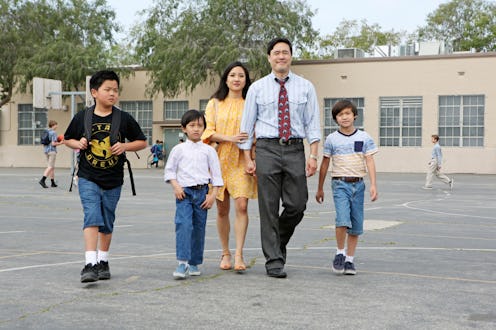
ABC’s Fresh Off The Boat is one of the most buzzed-about sitcoms of the season, and for good reason: Its portrayal of an Asian-American family is the first on network television since Margaret Cho’s All American Girl, which was cancelled in 1994. It’s funny, it’s fresh and ratings have been pretty good given its mid-season premiere status. And while it hasn't been formally announced, I'm betting Fresh Off The Boat will be renewed for a Season 2 pretty shortly. Just don't expect the man who inspired the series for the series to come along for the ride. [UPDATE: ABC has announced that Fresh Off The Boat will premiere on Sep. 22.]
Fresh Off The Boat is very loosely based off Eddie Huang’s memoir of the same name, following the Huang family’s journey from Washington, D.C. to Orlando so Eddie’s father can open his very own steakhouse. In a nutshell, Dad is obsessed with the "American dream," Mom (played by Constance Wu, who is a QUEEN of comedy and should be regarded as such) is stricken with culture shock (their D.C. neighborhood was primarily Chinese), and the three brothers struggle to assimilate into their new suburban culture, which is filled with mostly white people. Though ratings have slipped in recent months, Fresh Off The Boat’s buzz and positive critical reception mean that that show will probably get the renewal for Season 2. ABC hasn’t made any announcements just yet, but I’m willing to bet we’ll be seeing the Huang family on the airwaves next year.
But though the show may be a lock for renewal, what’s more interesting about Fresh Off The Boat is just how much the real Eddie has distanced himself from it. Huang has spoke out a great deal (mostly on Twitter) since the show’s premiere that the life he sees on the show is not indicative of the real-life experiences that were detailed in his memoirs.
Critics of Huang’s dissent say that this is what he signed up for when he sold the rights to his book to a broadcast network like ABC instead of a cable channel like, say, FX or Comedy Central, who have the option of making edgier shows. To an extent, that’s true. As a fan of both Fresh Off The Boats — the memoir and the television show — it’s amazing how starkly contrasting they are. On television, the bones of Huang’s tale have been filled in with markedly different flesh for primetime consumption. There is certainly room in this world for both portrayals of Huang’s life, but the bigger problem here is that there have to be two: Broadcast TV networks are just afraid to go there, lest they offend someone’s delicate sensibilities of real life.
Take a journey back in time with me: What sitcom of the 1980s/1990s (which is Fresh Off The Boat’s setting, funnily enough) didn’t have a handful of “very special episodes” a season? Those audiences saw gun violence, domestic abuse, drugs, and more, all before the watershed hour. Don’t get me wrong — it’s not like 1990s audiences were watching The Wire with mom and pop every Wednesday night over TV dinners. But television networks were at least noting these issues exist in society. Yes, there is domestic violence in the world. Yes, drugs and guns exist. Yes, there are people that have had different cultural upbringings than our own. And there was a modicum of a discussion about it. Today’s sitcoms are too happy-go-lucky, which is great for escapism but not great for cultural conversation. It is possible to go a little grittier and still make viewers happy. Why can’t we talk about any of these issues on TV now?
The success of shows like black-ish, Cristela, and Fresh Off The Boat have proven that the homogeneity of television is not what the people want. Now that there are many different faces on TV, why are networks shying away from the tough stuff? Let’s not pretend that just putting different people on TV is enough. In a 2015 article in New York magazine, Huang notes that the creators of Fresh Off The Boat equate the softer material of the show (versus the book) to a plate of orange chicken rather than a traditional, actual Chinese dish. Why? Americans can deal with orange chicken. They can eat it in their mall food courts, and eventually, the get used to it and try other things. It’s gateway Chinese food that is inoffensive and not at all Chinese. How about we break out the stinky tofu first instead? It’s real, it’s authentic, and even if you’re not sure if you like it, you tried it. And that gets people talking.
Image: Gilles Mingasson/ABC; Giphy